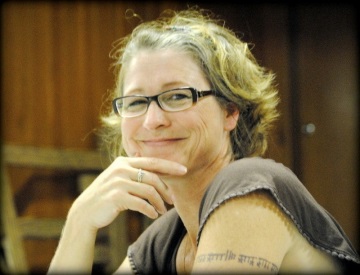by Michell Spoden

Building communities is so important especially in these trying times. So many people are coming together and working on projects that are successful. Historically, social planning and action have been a part of the foundational principles with grass roots organizations. Today we are here to learn a concept called “Time Banking” and have a chat with 48-year-old Abby Greer from Kent, Ohio.
Michell: Hi Abby, please tell our readers briefly about you.
Abby: Thanks so much for inviting me to this interview. I am the Executive Director of the Crooked River Alliance of Time Banks, Inc. and the Program Director for the Kent Community Time Bank.
Michell: What is hOur Share and how did it get started?
Abby: The hOur Share Exchange Center is a program of the Kent Community Time Bank, which is a “hub” of the Crooked River Alliance of Time Banks in northeast Ohio. One of our members researched how to exchange time for goods, products and food and designed the hOur Share. Essentially, the hOur Share is an alternative currency store where members can donate their time to have items and non-members can donate cash. There are no price tags on the items at the store. Members make a time contribution for what they feel is appropriate. If there was a brand new crockpot, for example, and a time banker wanted to take it home, the staffer would ask, “How much time are you willing to donate to the community to have that crockpot?” The member might suggest two hours, which would be two time credits (one hour equals one time credit). The hOur Share then earns two time credits and the time banker is debited two time credits.
Public shoppers can make cash donations for any of the items. The items in the store are acquired mostly by time bankers who donate new and like new items, jewelry, canned and boxed food, toys, cds as well as items that were hand crafted by time bankers. We find it magnificent that members are able to donate time to get food, instead of a government hand-out and it feels so much different.
You might ask, where do the time credits come from? Members of the Kent Community Time Bank are pooling their skills, talents and passions and exchanging them one hour at a time. One hour equals one time credit, not matter the service. It is not barter, nor is it volunteering. If I gave you a guitar lesson for one hour, you would gift me one time credit. I could then spend that time credit on any of the thousands of offers in the time bank. This is a non-contractual agreement and, therefore, considered not taxable by the United States government.
With over 630 members in the Kent Community Time Bank, services are as varied as the community it serves. We have dog walkers, lawyers, bakers, graphic design artists, computer repairmen and women, cleaning services, child care providers, massage therapists, drivers offering transportation, writers, photographers, bee keepers and web designers, to name a few.
Michell: Who came up with this idea and why?
Abby: The idea of time banking has been around for over 100 years. The concept of “Time Dollars” was created by Edgar Cahn (Time Dollars), a lawyer and social activist, in the ’80s. We have since used the word “Time Credits”. He came up with the idea because he felt as though our country was facing a true predicament where we were valuing the concept of monetary wealth over the individual assets and value that each and every one of us has.
Michell: How long has this organization been in existence? Is it a nonprofit or other type of entity?
Abby: The Kent Community Time Bank was launched in April, 2010. In 2013, time bankers “banked” 33.5 hours each and every day. The hOur Share opened its doors in April, 2013. Crooked River Alliance of Time Banks, Inc. was formed in 2013 and has applied for the federal non-profit status 501(c)3.
Michell: Who seems to use your organization most?
Abby: The wonderful thing about the time bank is that the members are incredibly diverse. We have homemakers, children, professionals, college students, retirees, seniors, organizations, merchants and, of course, those who are out of work at the moment. Those who have more time are typically likely to time bank more often. We find a high usage of the time bank with individuals who are seeking community. One of the many benefits of time banking is that is creates community. It helps create social networks and groups of like-minded people.
Michell: Can anyone start one of these organizations themselves or do they need to network with you?
Abby: Sure, anyone can start a time bank. However, starting a time bank is just like starting any other kind of enterprise. Time banks have a 75% failure rate because the people who start them underestimate the commitment and dedication it takes to run one. Often, people think that once you start it, it will run itself. We are also lacking any sort of centralized, structured materials and education on how to start and manage a time bank. Because of the success of the Kent Community Time Bank, we created Crooked River Alliance in order to help neighboring hubs and communities in northeast Ohio successfully manage their time banks. We offer training and resources as well as fundraising opportunities.
Michell: Why do you think Time Banks work in communities?
Abby: Starting with the obvious, time banking works because the state of our economy is in such poor condition. When people time bank, they are able to practice their skills, learn new skills, network with hundreds of new people as well as feel valued in the community. Many of our time bankers have acquired jobs through time banking. Second, time banking creates a new kind of community. This is a caring and sharing economy where the notion of deciding whose skill is more valuable is non-existent. We don’t compare our individual assets and value them differently. One hour equals one time credit. It removes barriers that a cash economy creates. Finally, we like to say that we are remembering community in that before the age of automobiles, air conditioning, and computers we used to rely on our neighbors. Over time, we have forgotten to trust in each other and believe that perhaps, part of our human existence is to help one another. Time banking creates a sense of belonging. No one feels isolated in the time bank.
Michell: Does your organization have any new goals you are working on?
Abby: We have many, many goals and ideas to further our mission. In northeast Ohio, we hope to create programs using the time bank to strengthen our public schools, integrate more senior citizens into the community (elder care), collaborate with local farmers, green spaces and gardens, develop a youth court system, create a car, bike, and workshop share, participate in neighborhood revitalization projects, assist in weatherization and alternative energy programs, and, of course, grow the number of hubs under the Crooked River Alliance of Time Banks.
Michell: Do you think that this concept teaches humanitarian beliefs?
Abby: This question might be answered best by telling you our core values that each and every time banker believes in: first, every single human being has something to offer to the community. Second, we re-define work by honoring everyone’s time equally. Third, we practice reciprocity asking how can we help each other create the world we want to live in. Four, social Networks create social democracy and a sense of belonging. And fifth, we respect ALL voices no matter the age, race, religion, or gender.
Michell: Is this sort of thing practiced in other countries?
Abby: Wikipedia shows time banking currently in 34 countries. There are an estimated 300 time banks in the United States.
Michell: Thank you so much for taking the time to do this interview with us and we wish you much success with your organization and all its goals.
About the Interviewer
Michell Spoden is the author of Stricken Yet Crowned and is also pursuing a transitional housing project for woman with an agricultural aspect. She has a degree in Business Science Administration and is finishing her bachelor’s in Project Management.


